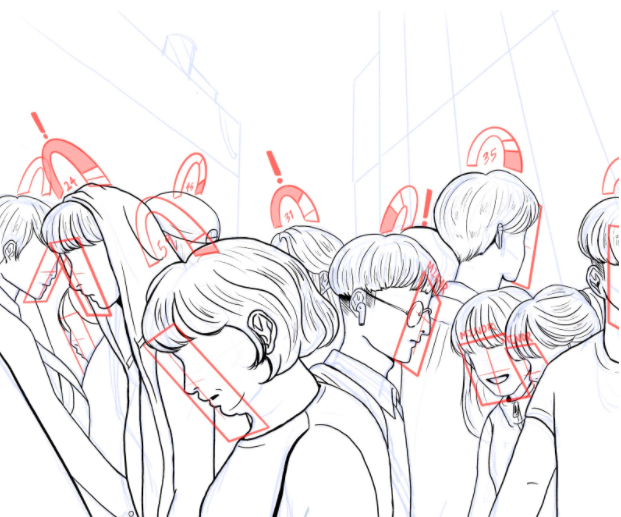The Social Credit System Phenomenon
Introduction to the Social Credit System
In 2007, the Chinese government unveiled a plan to create a Social Credit System to keep track of their people to keep them in check. Using a credit system, the Chinese government monitors its citizens and either praises or punishes them for their actions. In 2014, the Social Credit System started beta testing in several major cities such as Shanghai and Beijing, looking for “unethical” behavior in their people. In 2020, the Social Credit System has gone into full swing and has expanded all across most of the country and is at the end of the planning phase and fully surveilling its people. Although a Social Credit System is not an entirely new phenomenon, countries like the United Kingdom are accustomed to credit checks from data brokers. The Chinese government took this idea and completely revamped it. According to the Chinese government, the system will use data to build a society built on trust where individuals and organizations follow the law.
How it Works
So how does this Social Credit System work? The Social Credit System is made up of 3 different branches. There is one social credit system for citizens, one for businesses and other organizations, and one for government officials. Eventually, once fully completed, the target is that the government system will be countrywide. Businesses will be given a unified social credit code, and citizens will be given an identity number, with all citizens linked to a permanent record. Based on all of these factors, the Chinese party provides each individual with a score based on all the good/bad deeds. The maximum amount of points citizens can reach is 1,300 while the lowest amount of points possible is 600. Citizens with higher scores get to enjoy special “privileges” and rewards for their deeds. While those with low scores ultimately risk getting treated as “second-class” citizens and receive punishments for their actions.
According to Bernhard Bartsch(the Senior Expert on China and Asia-Pacific at Bertelsmann Stiftung) examples of good deeds that would raise a person’s score include:
- Charity Work
- Helping the poor
- Donating blood
- Helping with the elderly or helping elder family members
- Committing a “heroic” act
- Praising the government either in conversations or on social media
- Having a positive impact on the community
Examples of bad deeds that could lower a person’s score include:
- Not visiting one’s parents
- Drunk driving
- Jaywalking
- “Illegally” protesting against the authorities
- Criticizing the government either in conversations or on social media
- Participating in anything that is deemed as a “cult”
- “Insincere” apologies
The Public’s Opinion
In 2018, the Freie Universität Berlin surveyed 2,200 Chinese citizens on their opinion on the Chinese Social Credit system (most of which being from the major cities in China and being around the ages of 14-65). Nearly 80% of the people interviewed stated that they participated in the Social Credit System as citizens in a commercial setting. While 7% stated that they participated in beta testing for the Social Credit System, organized by their local city governments (For example, the 2014 implementation in major cities such as Beijing and Shanghai).
According to the study, the Chinese citizens living in major cities across the country benefited from good credit scores from specific acts they did during the day. 40% of the people surveyed stated that they did not have to leave a deposit when using a sharing service in the use of a bicycle or a car.
This and other examples make the people of China believe in the Social Credit System and that it has good values.
However, the Chinese government has received a lot of criticism from different countries and organizations. This is due to them believing that this is a breach of the privacy of its people as they are looking into the lives of their people and attempting to control what they do. For example, In May 2018, The Hill (an American news website) noted that “[t]he totalitarian 1984 of the future is now 2018 China.”
There has been a huge debate between nations and organizations about the privacy of people. It has been found that North Americans trust private companies over the government while the Chinese trust the government over private companies. According to Merics, “Students from China rated the measures more positively, with approval rates between 41 and 57 percent, than their German counterparts, who gave a maximum of 19 percent approval.” This creates an obvious divide between opinions in what is acceptable and what is deemed as a breach of privacy.
Interviews with People
To get opinions and different perspectives on this topic, I have interviewed a teacher of history and a doctor of International Relations focusing on the topic of China and the South China Sea, as well as an expat living in Hong Kong.
What is your understanding of the Social Credit System in China?
Teacher: “A system by which, mainly electronically, your socially acceptable behaviour (as defined by the CCP) will be materially rewarded, and unacceptable behaviour materially (later possibly legally) sanctioned.”
Doctor: “The system targets three groups: individuals, businesses and political institutions to monitor their economic and social, moral and perhaps ultimately political reputations. The official goal is to help bring back trust and good behavior into Chinese society. It works on a credit system with rewards and punishments such as public shaming and loss of privileges (train and plane rides for example) as retribution for poor behavior.”
Expat: “It’s a nationwide system to monitor the behaviour of individuals and rank them on the basis of their social credit”
Do you think the Chinese government is doing this to better the people or is it a way to control the population?
Teacher:“The way the Chinese are doing this is definitely extreme by gathering and utilizing information and making every citizen transparent with the help of cameras, with the help of monitoring. People in China believe that it is a good thing because we want to be able to behave in the best possible way. But then, of course, you heard, that for example, that cameras can pick up jaywalking, of course jaywalking is not a huge offense, and in Germany, if you jaywalk you get a ticket (although rarely used), but the use of cameras and the use of facial recognition technology, they can find out [instantly who it is and penalize them].”
Doctor: “Like the one-child policy which I mentioned which will help the people, so I think they are trying to get rid of people who run out on their bills or businesses that don’t pay their bills. I think there is good intention but I also think that some of the behaviors that they are trying to get rid of are a bit of a control issue.”
Expat: “Both — I don’t think it’s either/or”
Do you think that this will influence other countries to do the same?
Teacher: “There is an increasing temptation of government to go ‘big government’, particularly with the new technological (electronic) means available today. This is increasingly shown in many countries, even former liberal countries, during the so-called Corona crisis.”
Doctor: “Yes, to a certain extent such as the future use of facial recognition technology. China is unique in that it has a history of documenting people’s lives.”
Expat: “Possibly — it’s every authoritarian’s dream come true”
How do you think this will affect the country in the future?
Teacher: “Of course a large portion of this is driven by technology is creeping into our lives, and gives governments more of an opportunity to look into our lives and to utilize this somehow…”
Doctor: “I think that it might have a few short-term positive effects but hard to say long term. It could be like the one child policy which was implemented with good intentions but had disastrous consequences.”
Expat: ”People (like teenagers) always find ways around governmental restrictions.”
Is there anything similar in the country where you are from?
Teacher: “I am from Germany, so the previous two questions apply. If you read the newspapers especially in countries like Switzerland and Germany. If you really pay attention to what they are saying, there is this huge discussion whether or not this is a good idea or a bad idea, and it gives us two different views… Now we need to see who is right…”
Doctor: “USA-the FICO scoring system which helps determine your financial creditworthiness for things like mortgages.”
Expat: “Not at the moment — Hong Kong“
Looking into the background of the people, the opinions of those living in China, and the opinions of those from abroad, it does seem to come down to what the future holds for the nation of China and that this is a very divided issue depending on a person’s views. There are people who believe that it is useful to straighten out people who are lazy or people who need help. However, it is also seen to be very evasive to the privacy of the people and the Chinese Social Credit System is very extreme in its approach. As our world delves further into the pandemic going on right now, the idea of a Credit System seems to be more appealing to China and to other countries as a means to control the number of cases in each country. This means that if we were to look into the future, a credit system could be in place in other countries around the world with enough support financially and with its people.






d'Artagnan • Oct 28, 2020 at
I love how the article is presented in a very unbiased way and how informative it has been made with almost perfection.